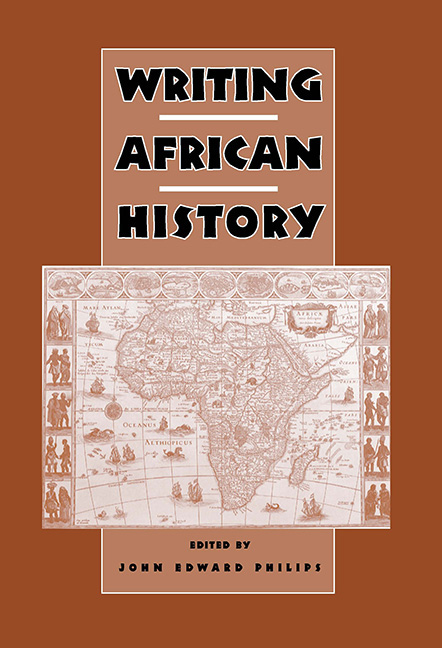Book contents
- Frontmatter
- Dedication
- Contents
- Acknowledgments
- Introduction
- Part I Background
- Part II Sources of Data
- 2 Archaeology and the Reconstruction of the African Past
- 3 Writing African History from Linguistic Evidence 86
- 4 Physical Anthropology and African History
- 5 The Importance of Botanical Data to Historical Research on Africa
- 6 Oral Tradition as a Means of Reconstructing the Past
- 7 Oral Sources and the Challenge of African History
- 8 Arabic Sources for African History
- 9 European Documents and African History
- 10 Mission and Colonial Documents
- Part III Perspectives on History
- Part IV Conclusion
- Contributors
- Index
- Miscellaneous Endmatter
2 - Archaeology and the Reconstruction of the African Past
from Part II - Sources of Data
Published online by Cambridge University Press: 11 May 2017
- Frontmatter
- Dedication
- Contents
- Acknowledgments
- Introduction
- Part I Background
- Part II Sources of Data
- 2 Archaeology and the Reconstruction of the African Past
- 3 Writing African History from Linguistic Evidence 86
- 4 Physical Anthropology and African History
- 5 The Importance of Botanical Data to Historical Research on Africa
- 6 Oral Tradition as a Means of Reconstructing the Past
- 7 Oral Sources and the Challenge of African History
- 8 Arabic Sources for African History
- 9 European Documents and African History
- 10 Mission and Colonial Documents
- Part III Perspectives on History
- Part IV Conclusion
- Contributors
- Index
- Miscellaneous Endmatter
Summary
In his Preface to Africa in Time Perspective, the classic work that was the inspiration for the present volume, Daniel McCall notes that he had visualized the volume “as a handbook which would provide the neophyte with an adequate guide to the use of all the techniques of research in the varied and confusing fields of historical research. Certainly, we need such a book.” Almost forty years after the publication of McCall's book, which so admirably served this purpose, an update is just as certainly needed. But the archaeologist contributing to this project is faced with the same dilemma noted by McCall, namely, that archaeology already has “adequate handbooks which are in greater amplitude than could be squeezed into a book that has to cover so many other topics.” McCall resolved this dilemma by writing with brevity on the subject of archaeology, restricting himself to a number of essential points, several of which have lost none of their relevance.
Following McCall's example, I attempt here to present a number of issues that I believe to be central for anyone, but especially historians, hoping to better understand the enterprise of archaeology in Africa today. McCall's admirable brevity will not, alas, be repeated, partly because archaeology is today a much more contentious and diverse discipline than it was in the 1950s and early 1960s. At that time, African archaeology was the enterprise of a remarkably small and relatively homogenous group of active fieldworkers. Virtually all were European, a fact which united them, in terms of archaeological practice and interpretation, more than their different nationalities divided them. They shared a common understanding of history and “prehistory” as distinctly different domains, and agreed broadly that a major objective of archaeological research was the description of artifact assemblages and the construction of artifact typologies, which corresponded in some meaningful way to past cultural identity. By mapping assemblages through time, they sought to produce a sequence, or history, of cultures through time.
Although culture histories are still constructed as the main goal of archaeology in parts of Africa today, the practice of archaeology is characterized by considerable diversity, comprising a variety of sometimes contradictory theoretical stances about the kind of histories archaeologists should try to write. No wonder historians get confused about how archaeologists reconstruct the past!
- Type
- Chapter
- Information
- Writing African History , pp. 51 - 85Publisher: Boydell & BrewerPrint publication year: 2005

